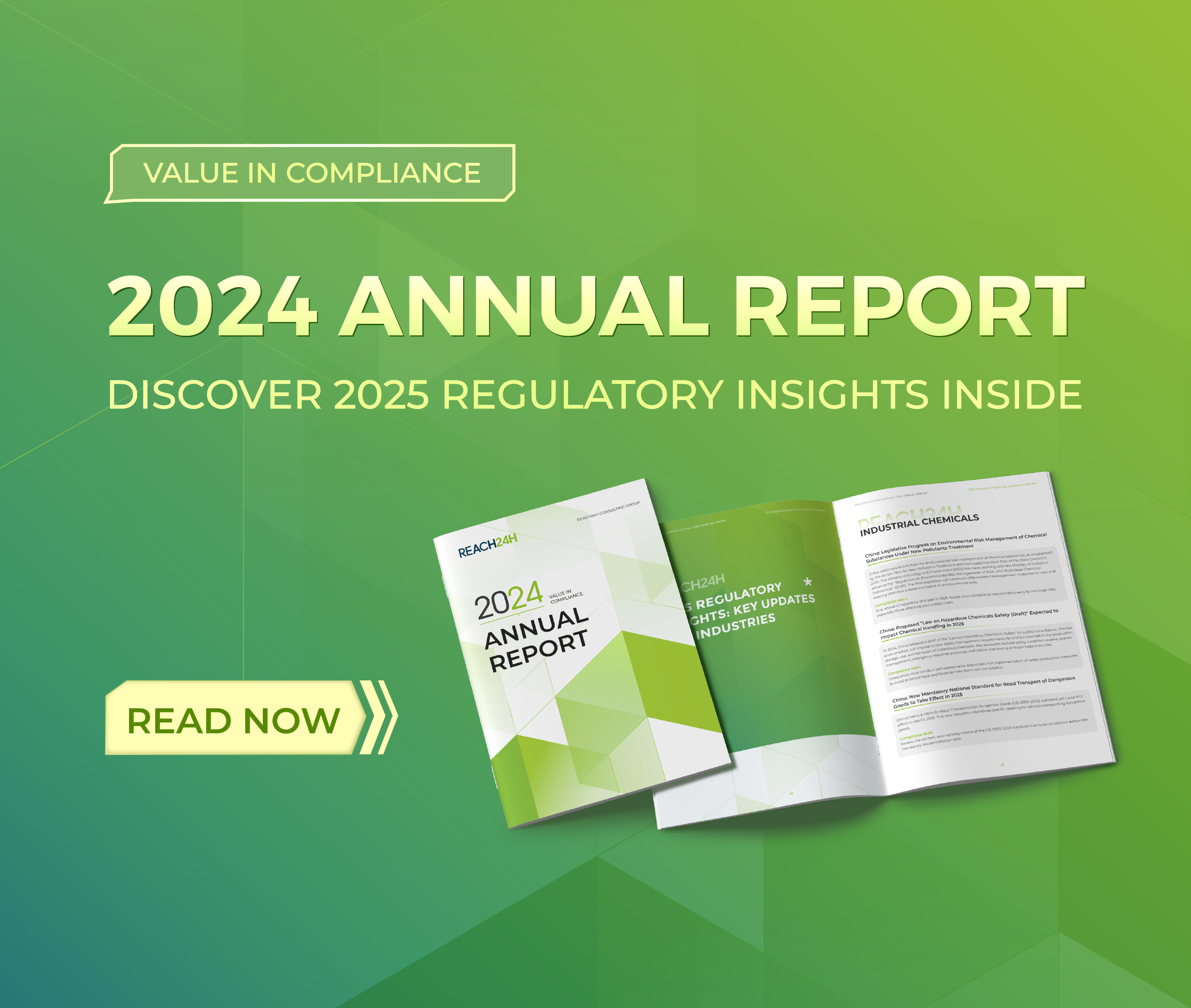Food Contact Notification (FCN) News in April
According to FDA official website, 6 food contact notifications (FCN) have been approved by FDA in April, and their information is shown in the table below:
|
Notifier |
Effective Date |
Name of The Substance |
Intended Use |
Limitations/Specifications |
|
Enviro Tech Chemical Services, Inc. |
Apr 1, 2018 |
An aqueous mixture of peroxyacetic acid (CAS Reg. No. 79-21-0), hydrogen peroxide (CAS Reg. No. 7722-84-1), acetic acid (CAS Reg. No. 64-19-7), 1-hydroxyethylidene-1,1-disphosphonic acid (HEDP) (CAS Reg. No. 2809-21-4), and, optionally, sulfuric acid (CAS Reg. No. 7664-93-9). |
As an antimicrobial additive that may be used alone or in combination with other processes in the commercial sterilization of aseptic filling systems and glass and plastic food packaging and their enclosures prior to filling, except for use on food packaging used in contact with infant formula or human milk or on aseptic filling equipment used to fill such packaging (see Limitations/Specifications). |
The components of the FCS mixture will not exceed 4500 ppm peroxyacetic acid, 6600 ppm hydrogen peroxide, and 180 ppm HEDP. If the FCS mixture is applied at a rate exceeding 0.0175 milliliters treatment solution per ounce container capacity, the FCS mixture must be drained from the container and rinsed with sterile water and drained again. FDA’s review of the use of the FCS to sterilize aseptic filling systems is limited to the extent that the FCS residues may transfer from the non-food contact surfaces of the aseptic filling system to food packaging materials. The FCS is not for use on food packaging used in contact with infant formula or human milk or on aseptic filling equipment used to fill such packaging. Such uses were not included as part of the intended use of the substance in the FCN. |
|
The Sherwin-Williams Company |
Apr 2, 2018 |
Glycidyl methacrylate polymer with styrene and methyl methacrylate (CAS Reg. No. 29564-58-7). |
The FCS will be used as an adhesion promoter resin. The FCS may be used in the production of coatings on metal substrates for can side seam stripes for food-contact articles, except for use in contact with infant formula and human milk (see Limitations/Specifications). |
Coatings containing the FCS may contact all food types, except beverages and alcoholic foods, under Conditions of Use A through H. The FCS is not for use in contact with infant formula and human milk. Such uses were not included as part of the intended use of the substance in the FCN. |
|
LANXESS Corporation |
Apr 9, 2018 |
2-propenoic acid, methyl ester, polymer with 1,7-octadiene, diethenylbenzene, ethenylethylbenzene and 2-propenenitrile, modified with N1,N1-dimethyl-1,3-propanediamine |
As a resin in food-contact applications to treat food solutions (see Limitations/Specifications). |
The finished resin is intended for repeat use in the processing of food solutions of sugar, sweeteners, pectin, gelatin, polyols, and whey; fruit juice; and organic food acids. The FCS may be used to treat whey that is used in the production of infant formula. No other uses in contact with infant formula and human milk were included as part of the intended use of the substance in the FCN. |
|
BillerudKorsnäs AB |
Apr 15, 2018 |
Microfibrillated cellulose pulp. |
As a dry and wet-strength agent employed prior to the sheet-forming operation in the manufacture of coated and uncoated food-contact paper and paperboard. |
The FCS will be used at levels not to exceed 5.0 percent by weight of the dry fibers in the finished paper and paperboard in contact with all types of food, as described in Table 1, under Conditions of Use A through H, as described in Table 2. Permitted uses in contact with infant formula: coated paper and paperboard manufactured with the FCS may be used in contact with powdered and liquid infant formula. |
|
SNF S.A.S. |
Apr 21, 2018 |
2-Propen-1-aminium, N,N-dimethyl-N-2-propen-1-yl-, chloride (1:1), polymer with 2-propenamide, decarboxylated, hydrochlorides (CAS Reg. No. 913068-94-7). REPLACES FCN 971 |
As a dry strength agent in food-contact paper and paperboard, except for use in contact with infant formula and human milk (see Limitations/Specifications). |
The level of the FCS in the finished paper/paperboard will not exceed 0.5 percent by weight. For use in contact with all food types under Conditions of Use A through H, as described in Table 2. The FCS is not for use in contact with infant formula and human milk. Such uses were not included as part of the intended use of the substance in the FCN. |
|
Indorama Ventures USA Inc. and its stewarded affiliates around the world |
Apr 21, 2018 |
Isophthalic acid (CAS Reg. No. 121-91-5). |
As a monomer in the manufacture of ethylene terephthalate-isophthalate copolymers, except for use in contact with infant formula and human milk (see Limitations/Specifications). |
The finished copolymers must contain from 3 to 17 weight percent ethylene isophthalate units. The finished copolymers must also meet specifications in 21 CFR 177.1630(f) – (j) appropriate to their intended use. The FCS is not for use in contact with infant formula and human milk. Such uses were not included as part of the intended use of the substance in the FCN. |
REACH24H has extensive experience in United States food contact materials (FDA /FCN / 21 CFR), EU food contact materials (EU 10/2011/BfR) and China food contact materials (GB 9685, GB 4806.X). We have the capability to advise and identify a regulatory strategy for successful registration. If you require any further information, please contact Ms. Mao send e-mail to maohongliang@reach24h.cn


